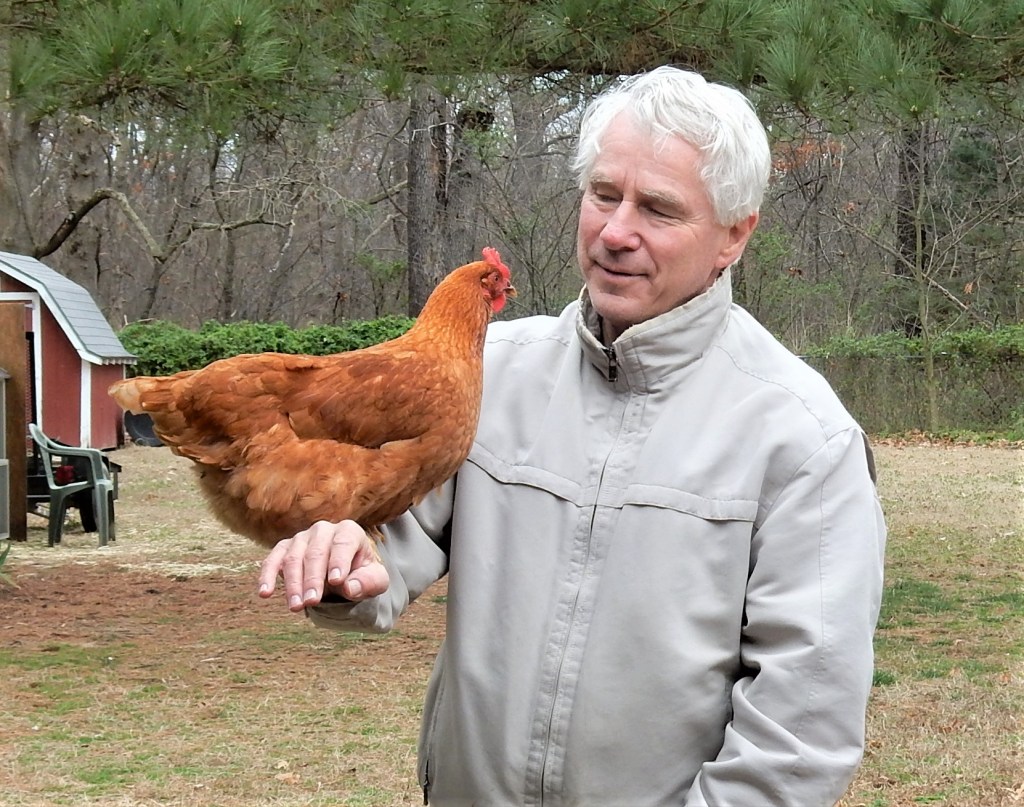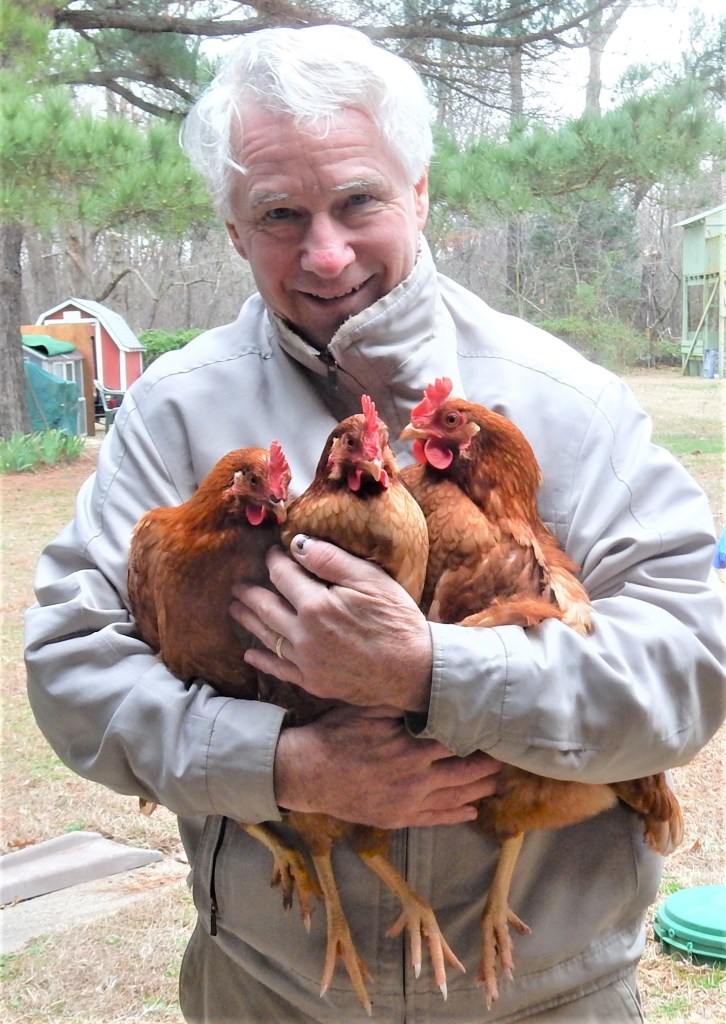Two of my chickens don’t like to be picked up, but something was different today.
I prepared their mix of goodies which consists of whole-grained rolled-oats, dried meal worms, cut-up apples, bread bits, and scratch. Water and the 16% protein meal called Crumbles are available 24/7.

As I tossed the mix out for them, Elona and Baby wanted to be picked up. These two, and Goldie, are the ones who always want to be loved on. I picked up Baby, then Elona. But this time, Whitey and Red Head came up. That’s unusual because they are the more elusive ones.
As I held and talked with Elona – she was explaining life to me – Whitey stood at my feet.
“You want up, Whitey?” She took a step closer.
I put Elona down and scooped up Whitey. She cocked her head, looked at me from both sides of her head, and talked – but not freely as do Baby, Elona, and Goldie. They chatter with me, but Whitey merely said a few syllables. (I’m not joking.)
Then Goldie walked up and began pecking on my britches. That’s her signal to pick her up. Elona does that, too.
I put Whitey down and scooped up Goldie, and she began telling me what she’s been doing lately. I then felt Red Head bump against me as she was looking for more worms. I put Goldie down and picked up Red Head.

She squirmed a bit but didn’t try to get away. However, she wouldn’t talk at all. Red Head merely looked at me as if to say, “Are you happy now that I let you pick me up?” When she looked at the ground and wiggled her legs, I put her down, and she continued her search for worms. I had an extra worm in my hands, so I said, “Red Head – you want this?”
Without hesitation she jumped up, and with outstretched neck grabbed it with her beak. At that movement, the others came running. They wanted it! Do you know the chicken’s philosophy of life? Here it is: If I have it, it’s mine. If you have it, it’s mine. And if I had it but you took it, it’s still mine!
So, I threw out another handful of dried meal worms; that generated another feeding-frenzy.

I often hold all five of the chickens – no more than three at a time, of course. I watch over my flock because (this may sound strange) I love them. I care for them and feed them very well. After losing the rooster (Fred) because I forgot to lock the coop, I always make sure they are safe and secure at night. They, in turn, come running to me every time I go out the back door. Again, as strange as it sounds, these babies love me – at least, as much as chickens know how to love.
Do you know that God loves us and wants to take care of us? But He does much more than I can do for my birds. I watch over my flock on a limited scale at best, but our Creator-Savior is a good shepherd and watches over His flock 24/7. He knows what’s happening with us every second of the day. He desires to “hold us” and care for us, and He goes out of His way to keep us safe and secure – if we let Him.
Amazingly, God is also limited in what He can do for us. What’s the limitation?
We are the limiting factor.
If my chickens wanted to, they could fly over the fence and escape my protective, nurturing care. They would be independent to roam freely. But they don’t. They stay with me, they trust me, they’re secure with me.
But many humans don’t have the wisdom my chickens have, and they run from God. Desiring independence, they “fly over the fence.” They fly from safety and into danger. They run from plenty, and into poverty. That’s not wise.

John 14:21 tells us that whoever loves the Lord – those who listen to and obey Him – are the ones to whom God the Father will reveal Himself.
If we run to God, and remain in His protective care, we can receive the “mix of goodies” that He wants to give us – in addition to His sustaining care available 24/7.
God loves you and desires to communicate with you. Study the Bible, learn to know Jesus, and find your security in and with Him. You may be surprised at the results.











 years old, we lived in El Cajon, California. My dad put me on the top bunkbed, and said, “I want you to jump to me.” (Yes, the lights were on.) But I was afraid of falling, so I told dad I didn’t want to jump. Dad promised me that there was absolutely no way I could fall, because even if I jumped awkwardly, or inadvertently fell off the bed, he would still catch me.
years old, we lived in El Cajon, California. My dad put me on the top bunkbed, and said, “I want you to jump to me.” (Yes, the lights were on.) But I was afraid of falling, so I told dad I didn’t want to jump. Dad promised me that there was absolutely no way I could fall, because even if I jumped awkwardly, or inadvertently fell off the bed, he would still catch me.
 God face-to-face and defend himself, but he never lost his faith. Job 13:15a says, “Though he [God] slay me, yet will I trust in him.” In chapter 19 verse 25, Job proclaims, “I know that my Redeemer lives, and he will eventually come to the earth.” And God, in the form of Jesus of Nazareth, did come to earth to redeem us.
God face-to-face and defend himself, but he never lost his faith. Job 13:15a says, “Though he [God] slay me, yet will I trust in him.” In chapter 19 verse 25, Job proclaims, “I know that my Redeemer lives, and he will eventually come to the earth.” And God, in the form of Jesus of Nazareth, did come to earth to redeem us. Chickens are curious creatures: they want to get into everything, fly over anything their limited flight ability will allow, and go where no chicken has gone before. But while they will run from a person who is trying to catch them, and run from another animal coming at them, their little minds cannot understand the inherent danger involved in leaving the protection established by their keeper.
Chickens are curious creatures: they want to get into everything, fly over anything their limited flight ability will allow, and go where no chicken has gone before. But while they will run from a person who is trying to catch them, and run from another animal coming at them, their little minds cannot understand the inherent danger involved in leaving the protection established by their keeper. with each other, eat more, cluck to their heart’s content, and enjoy life. So why do they spend an inordinate amount of time at the gate looking out? Within the yard, they have all they will ever need. They are safe from all kinds of predators … and cars. Yet with their half-inch-long brain, there is no way they can understand the dangers outside the fold. Neither safety nor danger enters their little minds, so they roam wherever they feel like it at the moment.
with each other, eat more, cluck to their heart’s content, and enjoy life. So why do they spend an inordinate amount of time at the gate looking out? Within the yard, they have all they will ever need. They are safe from all kinds of predators … and cars. Yet with their half-inch-long brain, there is no way they can understand the dangers outside the fold. Neither safety nor danger enters their little minds, so they roam wherever they feel like it at the moment. Wisdom enables us to see through problematic situations; to understand and heal wounded relationships; to formulate a plan of action. Wisdom enables us to avoid hurting others and helps us to understand and love more completely. Wisdom enables us to accomplish our God-given goals. Wisdom helps us to understand Who God, what He desires of us, and to obey Him. As we remain obedient to the Lord, He grants us wisdom to understand and enjoy life.
Wisdom enables us to see through problematic situations; to understand and heal wounded relationships; to formulate a plan of action. Wisdom enables us to avoid hurting others and helps us to understand and love more completely. Wisdom enables us to accomplish our God-given goals. Wisdom helps us to understand Who God, what He desires of us, and to obey Him. As we remain obedient to the Lord, He grants us wisdom to understand and enjoy life. Northern New Mexico. Our house was situated on a half-acre with 78 pine trees throughout the yard, and eight acres of meadow and forest were next door. We were at 7,830 feet altitude and it was a cool autumn day with no clouds in the blue sky. A light breeze was blowing which caused the pine trees to gently sway, polka-doting the ground as they dropped their pine cones. As we sat on our deck, Carol brought out iced tea and sandwiches as we discussed whatever came to our minds. We’ve known the Whittleseys–who now live in Tulsa–since October of 1970, and they are life-long friends. Correction: they are eternity-long friends.
Northern New Mexico. Our house was situated on a half-acre with 78 pine trees throughout the yard, and eight acres of meadow and forest were next door. We were at 7,830 feet altitude and it was a cool autumn day with no clouds in the blue sky. A light breeze was blowing which caused the pine trees to gently sway, polka-doting the ground as they dropped their pine cones. As we sat on our deck, Carol brought out iced tea and sandwiches as we discussed whatever came to our minds. We’ve known the Whittleseys–who now live in Tulsa–since October of 1970, and they are life-long friends. Correction: they are eternity-long friends. zipped down to where the bird had fallen. It picked up a lifeless sparrow with its needle-sharp talons and flew away.
zipped down to where the bird had fallen. It picked up a lifeless sparrow with its needle-sharp talons and flew away. In Pagosa Springs, Colorado, I saw a Bald Eagle swoop down and grab a fish, but was almost pulled under water. After a brief struggle, it managed to lift off with a sixteen-inch rainbow trout in its iron grasp. Struggling to gain altitude, it managed to fly a hundred yards to a tree. Then, after resting for a few minutes, while almost dropping its catch, it finally began eating its fresh trout dinner.
In Pagosa Springs, Colorado, I saw a Bald Eagle swoop down and grab a fish, but was almost pulled under water. After a brief struggle, it managed to lift off with a sixteen-inch rainbow trout in its iron grasp. Struggling to gain altitude, it managed to fly a hundred yards to a tree. Then, after resting for a few minutes, while almost dropping its catch, it finally began eating its fresh trout dinner. of weapons. These evil people want our money, our property, our identification, and our reputation. They use scams, casinos, pyramid schemes, loan shark offices, guns, online threats, and even steal information at ATM machines. Concerning casinos, one man said that as long as you’re willing to expose yourself to the money-losing game, the casino operators need only sit back and wait. And with increasing availability of casinos across the U.S., they don’t need to wait long.
of weapons. These evil people want our money, our property, our identification, and our reputation. They use scams, casinos, pyramid schemes, loan shark offices, guns, online threats, and even steal information at ATM machines. Concerning casinos, one man said that as long as you’re willing to expose yourself to the money-losing game, the casino operators need only sit back and wait. And with increasing availability of casinos across the U.S., they don’t need to wait long. safe in the leafy maze. Our granddaughters play all around the yard, including near the vines, but the birds know the girls are not a threat to the eggs and fledglings.
safe in the leafy maze. Our granddaughters play all around the yard, including near the vines, but the birds know the girls are not a threat to the eggs and fledglings. and the golden retrievers next door when we lived in New Mexico. Although separated by a five-foot chain-link fence, the retrievers wanted to kill Taffy and always “barked their heads off” every time they saw him.
and the golden retrievers next door when we lived in New Mexico. Although separated by a five-foot chain-link fence, the retrievers wanted to kill Taffy and always “barked their heads off” every time they saw him. rejection are storms.
rejection are storms. history lesson. Please understand that this is an ongoing debate among theologians, and it won’t end with this writing. But I will, nevertheless, shed some historical light on the subject.
history lesson. Please understand that this is an ongoing debate among theologians, and it won’t end with this writing. But I will, nevertheless, shed some historical light on the subject. Augustine eventually returned to his Christian upbringing, but he created a Christianized version of the belief. Some call it fatalism. That is, we cannot change what has been predestined for us. And he misapplied Romans 8:29 to support him. It says, “For whom he [God] did foreknow, he also did predestinate to be conformed to the image of his son.” The emphasis was meant to be on foreknow, but Calvin put it on predestinate. Paul wasn’t talking about God choosing whom He will save. Instead, he is talking about God’s omniscience – the fact that God knows everything, including who will eventually ask the Lord to forgive him or her and allow them into the Kingdom of God.
Augustine eventually returned to his Christian upbringing, but he created a Christianized version of the belief. Some call it fatalism. That is, we cannot change what has been predestined for us. And he misapplied Romans 8:29 to support him. It says, “For whom he [God] did foreknow, he also did predestinate to be conformed to the image of his son.” The emphasis was meant to be on foreknow, but Calvin put it on predestinate. Paul wasn’t talking about God choosing whom He will save. Instead, he is talking about God’s omniscience – the fact that God knows everything, including who will eventually ask the Lord to forgive him or her and allow them into the Kingdom of God. Election, By Which God Has Predestinated Some To Salvation, And Others To Destruction.” Some call this hyper-Calvinism. It is not Biblical because there are many verses in the Bible that prove God wants everyone to turn from a life of sin. God wants everyone to live a good life and go to heaven.
Election, By Which God Has Predestinated Some To Salvation, And Others To Destruction.” Some call this hyper-Calvinism. It is not Biblical because there are many verses in the Bible that prove God wants everyone to turn from a life of sin. God wants everyone to live a good life and go to heaven. Friends, that is not the God of the Bible.
Friends, that is not the God of the Bible. The interaction between the rotating tires and pavement generates a lot of friction, and friction generates heat. The faster the movement, the higher the heat. Rub your hands together and see what I mean. At 70 mph, truck tires (at an average diameter of 41 inches and inflated to 100 psi) rotate about 34,433 times each hour and can attain temperatures of 120 degrees F. This heat can raise the tire pressure to about 120 psi.
The interaction between the rotating tires and pavement generates a lot of friction, and friction generates heat. The faster the movement, the higher the heat. Rub your hands together and see what I mean. At 70 mph, truck tires (at an average diameter of 41 inches and inflated to 100 psi) rotate about 34,433 times each hour and can attain temperatures of 120 degrees F. This heat can raise the tire pressure to about 120 psi. smoldering. If the hot rubber lands off the road, the heat can ignite dried grass and weeds. The deteriorating tire also leaves a trail of debris on the highway which presents a safety hazard.
smoldering. If the hot rubber lands off the road, the heat can ignite dried grass and weeds. The deteriorating tire also leaves a trail of debris on the highway which presents a safety hazard. the rear-view mirror for traffic. No one was close. I then hit the brake and swerved across both lanes to avoid the larger pieces of tire that were hurtling through the air. Superheated rubber fragments set grass on fire and other shrapnel damaged our windshield. Having avoided the larger pieces, we received no dents in the car. It was all over in four seconds.
the rear-view mirror for traffic. No one was close. I then hit the brake and swerved across both lanes to avoid the larger pieces of tire that were hurtling through the air. Superheated rubber fragments set grass on fire and other shrapnel damaged our windshield. Having avoided the larger pieces, we received no dents in the car. It was all over in four seconds.